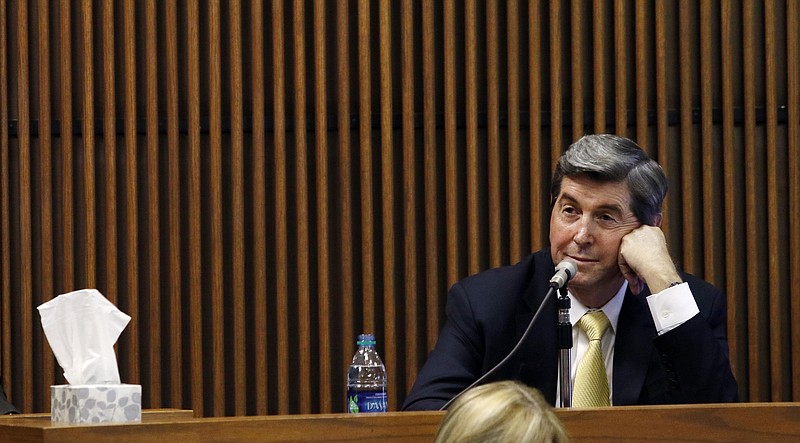OPELIKA, Ala. - In eight hours of sometimes contentious testimony, former Alabama Gov. Bob Riley on Monday described his efforts to help House Speaker Mike Hubbard find a new job - but insisted that Hubbard"made sure what he was doing was absolutely legal" and not in violation of any ethics laws.
Prosecutors kept Riley -a man Hubbard has described as a father figure and political mentor - on the witness stand for two days as they tried to prove Hubbard broke the state ethics law he once championed. Riley saidHubbard had asked to work at his lobbying and consulting firm. Some of those requests were serious and some were a running joke between the two old friends, Riley said.
"I need to be a salesman for GB&R. Except for those ethics laws. Who proposed those things?! What were we thinking?" Hubbard wrote to Riley in 2011. Republicans' first action, after winning control of the Alabama Legislature for the first time since Reconstruction, was to pass a new ethics law in a special session called by Riley.
"Of course it was a joke," Riley said as he responded to questions by prosecutor Matt Hart.
But with prompting from Hart, Riley also acknowledged what he told a grand jury: Hubbard was also serious about seeking help finding a job after being laid off by his primary employer, Auburn's IMG Sports Network.
"Mike and I talked about Mike working for me for two years," Riley said. "There was a point where it was serious. ... When he lost the IMG contract, he began to be serious about finding a way to support his family."
Hubbard, 54, faces 23 felony ethics charges accusing him of using the power and prestige of his political offices to benefit his companies and clients and to try to obtain $2.3 million worth of work, investments and financial favors. Hubbard argues the transactions were within the bounds of the ethics law and exemptions for normal business dealings and longstanding friendships such as the one he had with Riley.
Riley testified that, after leaving office, he and others brainstormed ways to help Hubbard find work and that he offered advice after Hubbard took a $12,000-a-month contract to do industrial recruiting for Southeast Alabama Gas District, a municipal-owned gas utility in the southeastern part of the state.
"I hope you can help me with the suppliers. ... I need to deliver something in order to justify my existence,"Hubbard wrote to Riley after congratulating him about Airbus' decision to build a facility in Mobile. As governor, Riley started negotiations to recruit the aerospace giant to the state and after leaving office signed the company up as a client at his consulting and lobbying firm.
In another email, Riley asked about the possibility of the Airbus CEO addressing a joint session of the Alabama Legislature. "I would like to meet him, if possible. I really need to get some of their printing business somehow,"Hubbard replied.
Riley said he suggested that Hubbard attend the 2013 Air Show. Riley said he arranged for him to meet with executives from another firm that Riley represented. Hart asked Riley if Hubbard was meeting those officials as speaker of the house or as a paid representative of a gas company.
"To me, I never segregated. ... He is the speaker of the house. He is an economic developer," Riley said.
The exchanges between Hart and Riley got testy at times. Hart cut off Riley's attempts to offer lengthy answers and asked permission to treat Riley as a hostile witness. Riley raised his voice when Hubbard asked if he had ever given Hubbard a "warning" about running afoul of state ethics law.
"It's a simple question," Hart said.
"It's not a simple question for one reason. You're asking a question not knowing the context of the question. It's the same thing you did in the grand jury," Riley retorted.
Riley eventually said he did offer a cautionary warning. Riley asked Hart if he wanted him to elaborate on what he said. Hart replied no.
Riley, under cross-examination by defense lawyer Bill Baxley, leapt to the defense of his old friend saying he thought he took precautions to stay within the bounds of the ethics law.
"On everything we ever discussed, he made sure what he was doing was absolutely legal," Riley said.
Baxley, who for years was one of the state's most prominent Democrats, attempted to emphasize the friendship between the two Republicans.
Riley said he had been friends with Hubbard since the mid-1990s and any action he took was because of their longstanding friendship and not because Hubbard was speaker of the House.
The defense cross-examination of Riley resumes Tuesday morning.
Prosecutors indicated to Lee County Circuit Judge Jacob Walker that they are nearing the end of their case. Baxley indicated that the defense could call a number of character witnesses, including Heisman Trophy winner Bo Jackson. Hubbard, as a young sports public relations representative for Auburn University, helped to craft the publicity campaign for Jackson's Heisman push.
